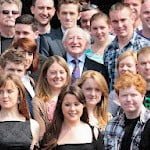Education reform was on the agenda at a convention in Áras an Uachtaráin this month. An initiative from President Michael D. Higgins started in May 2012 resulted in a comprehensive study involving 800 young people that culminated in the drafting of the “Take Charge of Change” declaration at the convention. A report entitled Being Young in Ireland 2012 was published as part of the initiative.
The initiative was to discover the vision of Ireland that young people see across all areas of life including education. High on the agenda was a fresh approach to teaching Irish and a reform of the current Leaving certificate, points system, and rote learning, which the group considered a barrier to “active citizenship”.
The young people called for legislation for the X-case, which is particularly relevant in light of the recent tragic circumstances of Savita Halappanavar the Indian Galway resident who sadly lost her life after she was refused an abortion. There was also a call for a referendum on abortion.
The presidency seminar was rich with thought and meaningful debate and highlighted the genuine concern of the next generation whose recommendations for a fairer and inclusive Ireland had clarity and maturity.
The “Being Young in Ireland 2012” report reveals concern about the future of the Irish economy, political reforms, and education that prepares citizens for a life equipped with the necessary skills to play a meaningful role in society.
Vision
The young people’s declaration was delivered in front of the President, Frances Fitzgerald Minister for Children, and a delegation of representatives from State agencies.
The vision states:
“Our vision for Ireland Is of a secular, inclusive, multilingual, confident State with excellent and universally accessible education, health and social support systems; an Ireland of which we can be proud on the global stage; a place where people, arts, culture, heritage, sport and the Irish language are nurtured and developed.”
The outline emphasises the value of human rights and equality of access to services with an emphasis on education, equal opportunities, and inclusion.
The President stated, “Any president of any country in the world would be enormously proud of the presentation”. He was full of praise for the focus on education, social justice, and the promotion of diversity.
“If anyone is in any doubt now about the myth that’s going around that young people are disengaged, disaffected, and cynical, well there is your answer,” he added.
The comprehensive declaration called on the lawmakers to extend adoption and equal marriage rights to gay, bisexual, lesbian, and transgender people. It also asked that the Government extend voting rights to the Diaspora abroad.
Main Proposals of the Declaration
- A double-edged approach to Irish teaching should be adapted at leaving certificate with a compulsory module (spoken Irish) and a second optional module (literature.) This new program should be steered by the Gaelscoileanna organisation.
- Legislation to be ratified for the X case.
- Social opportunity development for the Irish language.
- Equality of rights for adoption and marriage for all currently excluded persons.
- Introduce legislation to allow absent citizens outside their jurisdiction to vote.
- Initiate a young people’s campaign to encourage active citizenship.
- Allocate CAO points for community and voluntary work as part of a broader educational curriculum.
- Youth sector funding to be increased and maintained.
- Leaving Certificate reform where class participation is hands on with opportunities for lifelong learning.
- Local government changes that will allow national representatives to be uninvolved with politics at the local and regional level.
- Introduce lessons at primary and post primary level to teach children and young people on tolerance, acceptance, and diversity.
- Increase special needs education funding and extend the scope of the second level IT curriculum.
- Strive for an Irish State that is secular.
- Second level curriculum reform to include education in politics.
- Set up a new employment scheme for graduates that utilises their skills.
This may seem a Utopian vision but there is much to be learned from the fresh and unfettered minds of young people. In particular, their education vision takes an inclusive approach so that less academically minded students might gain a comprehensive education of value based on citizenship skills and their own personal talents.
Studying for life does not mean overlooking the basic essential skills but rather enhancing them using a variety of learning tools from different kinds of education modules and courses, and volunteer and community participation suited to individual talents. Participation in the community rewarded with CAO points could open doors for many students and give them self-confidence and sense of purpose.
A broader curriculum that allows students to pursue individual voyages of discovery establishing necessary life skills has much to recommend it. An inclusive society of well-rounded citizens who have a sense of unity and awareness of what active citizenship means is to be celebrated.
Author:
Denise Colebrooke
